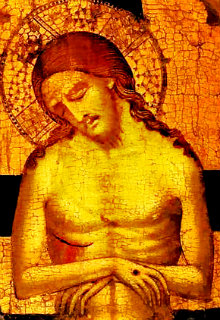100 Greatest Painters Artists Alphabetically Artists by Country Artists by Century Artists by Movement
Paolo
Veneziano
1333-1360
Italian Byzantine Style Painter of the Venetian school
Stylistically influenced by the following painters - Giotto Bondone

Throughout the Medieval period, Italian art was largely traditional, sticking to the techniques and style established by the Byzantine Church. Paolo Veneziano was one of the first to begin breaking away from the Byzantine formalism. He felt a real connection to classical Rome and frequently visited ancient Roman sites. His paintings are darkly mystical, infused with an ethereal emotional intensity. Rigid Geometric patterning and precision in capturing details are the underlying impetus behind his lushly painted works.
Motivation and Methods
During the time of Paolo Veneziano egg tempura was the medium used by most painters. Art historian and author Sarah Tytler explains "Colours were mixed with water or with size, egg, or fig-juice—the latter practices termed tempera (in English in distemper) before oil was used to mix colours. But painters did not confine themselves then to painting with pencil or brush, else they might have attained technical excellence sooner. It has been well said that the poems of the middle ages were written in stone; so the earlier painters painted in stone, in that mosaic work which one of them called—referring to its durability—'painting for eternity;' and in metals. Many of them were the sons of jewellers or jewellers themselves; they worked in iron as well as in gold and silver, and they were sculptors and architects as well as painters; engineers also, so far as engineering in the construction of roads, bridges, and canals, was known in those days. The Greek knowledge of anatomy was well-nigh lost, so that drawing was incorrect and form bad. The idea of showing degrees of distance, and the management of light and shade, were feebly developed. Even the fore-shortening of figures was so difficult to the old Italian painters that they could not carry it into the extremities, and men and women seem as though standing on the points of their toes."
The Church was the biggest patron of art between the 9th and 14th centuries and Veneziano enjoyed some financial success with steady commissions. He came from a family of painters and was schooled in Geometry, Rhetoric, Music, Grammar as well as art. Veneziano' s son Luca was also a painter and the two collaborated on many works.
The Meaning of Sacred Symbols in Paintings. Most prominently featured symbols and their meaning:
☼☼☼☼☼
Important Words, People, Phrases, Characteristics related to the Italian Renaissance Art Movement - rebirth, rediscovery of the classical world, City-state, Humanism, Humanist, Francesco Petrarch, Reform, The Prince, Theocracy, The Inquisition, Human Reasoning, Medici Academy, publication of Della Pittura, a book about the laws of mathematical perspective for artists, sfumato, chiaroscuro, linear perspective, Heliocentric Theory, Petrarch, Baldassare Castiglione, The Book of the Courtier, liberal arts, civic humanism, Verrocchio, secularism, Leonardo Bruni, Lorenzo Valla, Neo-Platonism, nominalism, Giotto, Masaccio, Botticelli, Quattrocento, vanishing point, Savonarola, oligarchy spiritually significant, illuminated manuscript, idealized biblical themes, scriptorium, emotion, illuminator, iconoclast, Michelangelo and Leonardo Da Vinci, Age of Discovery, axonometric drawing, curiosity about the natural world, mythology, realistic use of colours and light, Bonfire of the Vanities, Old Testament stories, ethereal and foggy backgrounds, Gospel parables, The Blackdeath, romanticized landscapes, Christian symbolism. Paradise
Search for Artists by Century Important Painters Born in the 13th Century Important Painters Born in the 14th Century Important Painters Born in the 15th Century Important Painters Born in the 16th Century Important Painters Born in the 17th Century Important Painters Born in the 18th Century Important Painters Born in the 19th Century☼☼☼☼☼
If you feel you have worthwhile information you would like to contribute we would love to hear from you. We collect essential biographical information and artist quotes from folks all over the globe and appreciate your participation. When submitting please, if possible, site the source and provide English translation. Email to historyofpainter@gmail.com
© HistoryofPainters.com 2017
If you like this page and wish to share it, you are welcome to link to it, with our thanks.
Milanese School,
Ferrara School
Sienese School
Florentine School
Venetian School
Early Renaissance
High Renaissance
Northern Renaissance
Popular Questions About Renaissance Art History
What is the difference between Italian Renaissance art and Northern Renaissance art?
How did the Black Death impact European art history?
How did the Inquisition impact European art history?
What was the influence of the Medici Academy on Renaissance painters?
What was the Bonfire of the Vanities?
Who were the greatest painters of the Renaissance?